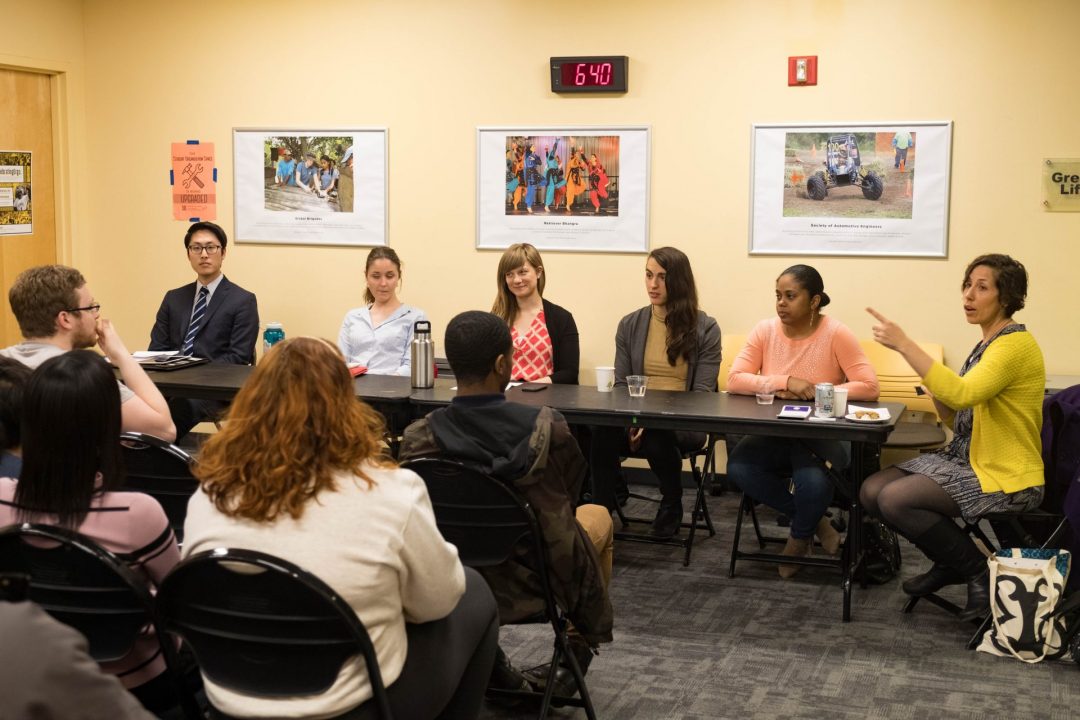Every April, the Women’s Center hosts its sexual violence awareness program, Take Back the Night, to support survivors. While this month was no different, the discourse after the event highlighted that more can be done about sexual violence on campus. Coffee and Conversation, an SGA forum, took the lead on maintaining the momentum throughout the year.
Markya Reed, a senior psychology major and SGA Vice President, organized a panel of leaders and activists from UMBC and the surrounding community. The panelists included Latrina Gillam, a storyteller from the House of Ruth; Ava Pipitone, executive director of the Baltimore Transgender Alliance; Aliya Webermann, a sexual violence activist and PhD student at UMBC; Haley Owens, a freshman biochemistry major and co-leader of We Believe You; and Erick Kim, a Title IX investigator. Jess Myers, director of the Women’s Center, served as the facilitator.
The panelists emphasized the importance of not only believing and supporting the people who were violated, but also holding the violators accountable. “For there to be survivors, there also have to be perpetrators,” Meyers reminded the audience. Some panelists agreed that universities, including UMBC, should be more transparent about the rate of sexual violence on their campuses. Gillam went further: “These organizations are trying to save their image. We have to forget about the image. We have to support the survivors.”
Reed hosted Beyond Take Back the Night as a part of the Coffee and Conversation series because “we only talked about Take Back the Night… We should have more discussions.” She and Webermann agreed that there is insufficient information about where or how to report sexual violence on campus. Webermann explained: “The information is buried on the Human Relations website. Most of our students aren’t getting this information.”
Kim, a representative from the UMBC Title IX office, described the actions his office takes to inform students about the presence of Title IX on campus. “We have been going to orientations at the beginning of the semester to put our faces out there and put our information out there,” Kim told the audience. “It really catches attention in April and dies down.” April is sexual assault awareness month. “If there’s one thing you remember, it’s that we’re here for you,” Kim added.
Kim identified resources for survivors, such as SAFE, UMBC’s partnership with local hospitals to provide free sexual assault forensic exams. Furthermore, all UMBC employees are trained in reporting sexual violence to the Title IX office. However, Owens said, “the narrative as of right now is that [survivors] feel unsupported by the university.” She went further and said “students don’t know who to go to; they don’t have a face to a name; they feel lost.”
Reed stated her personal interest in sexual violence discourse was “knowing women.” “Being a woman on a college campus, I know many other women who know about this thing,” Reed clarified. Owens later supported this view: “you cannot tell your story unless there’s someone to listen to you.” By giving survivors the space to speak and be heard, the panelists agreed that more could be done to prevent sexual violence. “Survivors should be at the table, leading the issues,” Webermann said.


